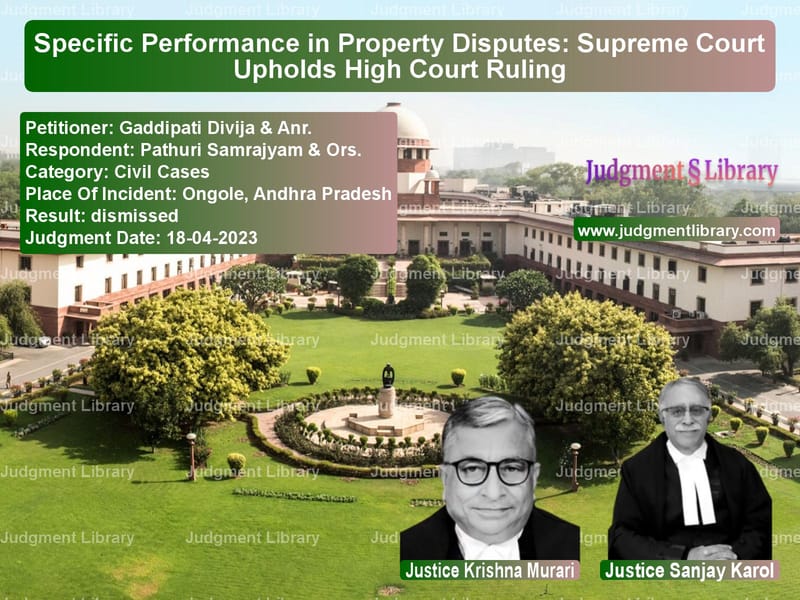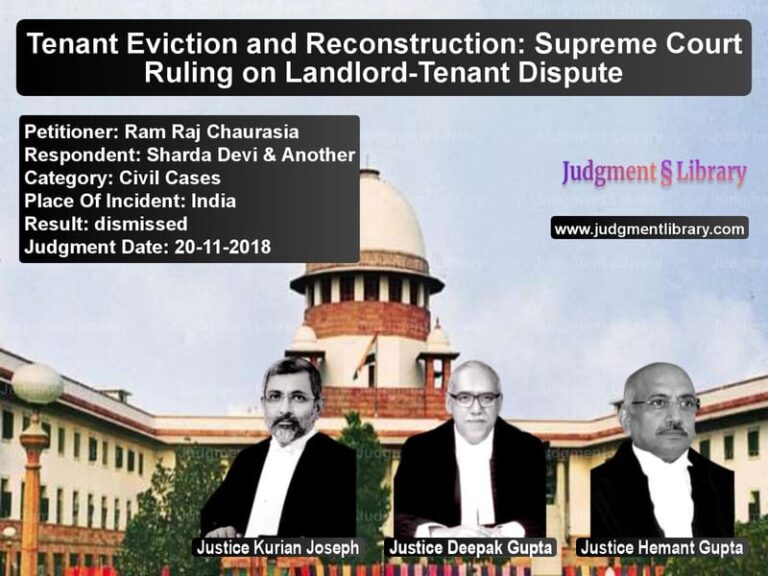Specific Performance in Property Disputes: Supreme Court Upholds High Court Ruling
The case of Gaddipati Divija & Anr. vs. Pathuri Samrajyam & Ors. revolves around the enforcement of a sale agreement and whether the buyer had demonstrated the necessary readiness and willingness to perform their part of the contract. The Supreme Court examined whether the High Court of Andhra Pradesh was correct in overturning the trial court’s ruling and granting specific performance of the sale agreement.
The Supreme Court upheld the High Court’s decision, affirming that the buyer had sufficiently demonstrated their readiness and willingness, while the seller had failed to perform their obligations under the agreement.
Background of the Case
The dispute arose from a sale agreement dated August 14, 2002, between G. Venugopala Rao (the seller) and Pathuri Samrajyam (the buyer), for a plot of land measuring 0.90 acres. The agreed sale price was ₹11,88,000, with the buyer paying an advance amount of ₹4,00,000. The sale deed was to be executed within three months, after the land was measured and demarcated.
However, disputes arose when:
- The seller issued a notice on January 2, 2003, demanding the balance payment of ₹7,88,000, stating that the agreement would be canceled if not paid.
- The buyer responded on January 10, 2003, claiming that the land had not been measured or demarcated and that it was under attachment due to an unpaid debt.
- The seller sent a rejoinder on January 21, 2003, asserting that the land had been measured and instructing the buyer to deposit ₹1,69,017 (for debt clearance) in court and pay the remaining amount.
- Despite these exchanges, the sale deed was never executed, and the seller passed away on May 13, 2003.
- The buyer filed a suit for specific performance on March 29, 2004, against the seller’s legal heirs.
Legal Proceedings
Trial Court Decision
- The trial court ruled that the buyer failed to prove readiness and willingness to perform the contract.
- It partially decreed the suit, ordering the refund of the advance amount with 6% interest.
- Specific performance of the sale agreement was denied.
High Court Decision
- The buyer appealed to the High Court, which reversed the trial court’s decision.
- The High Court ruled that the seller had failed to perform their obligations (measuring and demarcating the land).
- The court granted specific performance, directing the legal heirs to execute the sale deed after clearing outstanding debts.
Supreme Court Decision
- The legal heirs (appellants) challenged the High Court’s ruling, arguing that the buyer had not proven readiness and willingness.
- The Supreme Court upheld the High Court’s ruling, confirming that the buyer had been ready and willing to perform their part.
- The seller’s failure to measure and demarcate the land was seen as the primary reason for the transaction’s failure.
Arguments Presented
Petitioners (Seller’s Legal Heirs) Arguments
- The buyer did not demonstrate financial capability to pay the balance.
- The buyer remained silent for 14 months before issuing another legal notice.
- The property’s value had increased significantly, making execution of the original agreement unfair.
- The suit was filed for only 50 cents of the land instead of the full 90 cents, violating contract terms.
- The seller’s mother, a necessary party, was not included in the suit.
- The minors (seller’s legal heirs) were not properly represented in court.
Respondents (Buyer) Arguments
- The seller failed to measure and demarcate the land, preventing completion of the sale.
- The buyer was always ready to pay but was waiting for the seller to perform their obligations.
- The seller executed mortgages on the property, further complicating the sale.
- The High Court properly evaluated the evidence and corrected the trial court’s error.
Supreme Court’s Observations
The Supreme Court, led by Justices Krishna Murari and Sanjay Karol, made the following key observations:
- Readiness and Willingness: The buyer had sufficiently demonstrated readiness and willingness by issuing timely notices and seeking execution of the sale.
- Seller’s Failure: The seller failed to fulfill their obligation to measure and demarcate the land, which was a prerequisite for completing the sale.
- Time Not of Essence: In real estate transactions, time is generally not considered of the essence unless explicitly stated. The seller’s conduct suggested an attempt to delay the transaction rather than enforce it.
- Procedural Issues: The appellants’ claim that they were not properly represented was dismissed as they had been given multiple opportunities to appear.
Final Judgment
The Supreme Court upheld the High Court’s ruling, confirming that:
- The buyer had met the legal requirement of demonstrating readiness and willingness.
- The seller’s failure to measure and demarcate the land was the primary obstacle to execution of the sale.
- The trial court’s denial of specific performance was incorrect and was rightly overturned by the High Court.
- The buyer was entitled to specific performance, and the legal heirs were directed to execute the sale deed.
Implications of the Judgment
This ruling has significant implications for property disputes and the enforcement of sale agreements in India. The key takeaways include:
- Seller Obligations: Sellers must fulfill all prerequisites outlined in the contract, including measuring and demarcating land.
- Readiness and Willingness: Buyers must actively demonstrate their willingness through timely communication and financial preparedness.
- Time in Real Estate Transactions: Unless explicitly stated, time is not considered of the essence in real estate deals.
- Role of Courts: High Courts can intervene when lower courts fail to correctly assess contractual obligations.
Conclusion
The Supreme Court’s ruling in Gaddipati Divija & Anr. vs. Pathuri Samrajyam & Ors. reaffirms the importance of honoring contractual obligations in property transactions. By upholding the High Court’s ruling, the Court ensured that buyers who fulfill their legal requirements are protected from sellers who attempt to evade commitments.
This judgment serves as a reminder that real estate agreements must be executed in good faith, with both parties fulfilling their obligations. The decision strengthens the enforcement of sale agreements and provides clarity on the role of readiness and willingness in specific performance suits.
Petitioner Name: Gaddipati Divija & Anr..Respondent Name: Pathuri Samrajyam & Ors..Judgment By: Justice Krishna Murari, Justice Sanjay Karol.Place Of Incident: Ongole, Andhra Pradesh.Judgment Date: 18-04-2023.
Don’t miss out on the full details! Download the complete judgment in PDF format below and gain valuable insights instantly!
Download Judgment: gaddipati-divija-&-a-vs-pathuri-samrajyam-&-supreme-court-of-india-judgment-dated-18-04-2023.pdf
Directly Download Judgment: Directly download this Judgment
See all petitions in Property Disputes
See all petitions in Specific Performance
See all petitions in Contract Disputes
See all petitions in Judgment by Krishna Murari
See all petitions in Judgment by Sanjay Karol
See all petitions in dismissed
See all petitions in supreme court of India judgments April 2023
See all petitions in 2023 judgments
See all posts in Civil Cases Category
See all allowed petitions in Civil Cases Category
See all Dismissed petitions in Civil Cases Category
See all partially allowed petitions in Civil Cases Category







